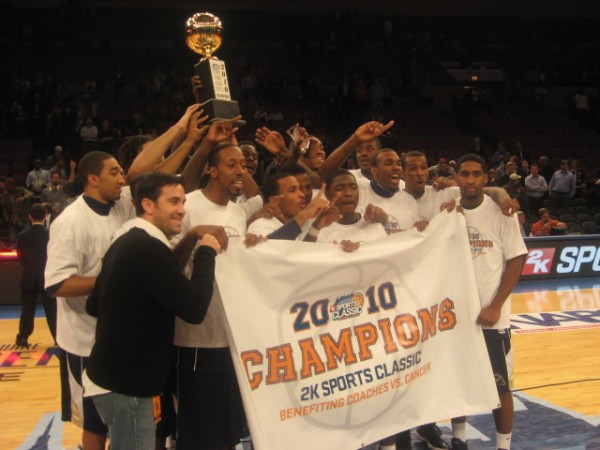Ball Control And Offensive Boards Key Panthers’ Run In New York
Posted by Brian Goodman on November 22nd, 2010Ray Floriani of College Chalk Talk is the RTC correspondent for the MAC and NEC, and makes additional contributions based on his analysis from action around the country.
Each of the four teams in the Coaches vs. Cancer ‘final four’ in New York left with something significant. Pittsburgh exited with the championship and an even better feeling of what they are all about. Texas left disappointed as runner-up but still encouraged they could take the #4-ranked team to the final possession with a limited rotation. Illinois showed resiliency coming back from a tough OT loss in the semis to post a nice consolation victory. Maryland, with a number of new faces, competed well both nights and received an encouraging two-day performance by sophomore center Jordan Williams.
First Semifinal
| eFG | FT RATE | OREB PCT | TO RATE | |
| Pitt | 49 | 48 | 41 | 22 |
| Maryland | 50 | 25 | 18 | 12 |
Possessions : 73
Off. Efficiency: Pitt 108, Maryland 96
The number that jumps off the page is offensive rebounding percentage. In raw numbers, Pitt owned the offensive glass 15-6 and the Panthers were beasts on the boards. Freshman forward/center Talib Zanna led the way with 12 rebounds but even junior guard Ashton Gibbs pulled down seven, which would have put him second on Maryland behind Williams’ eight caroms.
Not surprisingly, offensive boards give you great second-chance shots that can draw fouls. That FT rate margin is a bit inflated, as Maryland trailed and was in a late-game fouling mode to extend the contest.
Second Semifinal
| eFG | FT RATE | OREB PCT | TO RATE | |
| Texas | 47 | 36 | 44 | 13 |
| Illinois | 45 | 25 | 40 | 15 |
Possessions: 79
Off. Efficiency Texas 114 Illinois 106
The overtime affair ended about 12:30 AM. Virtually every statistic was even except in the free throw category. Texas was 25-44 from the charity stripe while Illinois shot 18 for 28. On a closer look, shot selection was a determining factor for the imbalance in trips to the line. Texas shot 17% (12 of 69) of their attempts from three while Illinois was 40% (29 of 73) in the same field goal attempt category. Simply, if you want to draw fouls, attack the basket, don’t bomb from outside.
Consolation
| eFG | FT RATE | OREB PCT | TO RATE | |
| Maryland | 47 | 19 | 47 | 22 |
| Illinois | 55 | 23 | 31 | 17 |
Possessions : 72
Off. Efficiency : Illinois 111, Maryland 106
In one night, Maryland improved dramatically in the rebounding department. The Terrapins had a significant 20-11 edge on the offensive glass. Illinois’ ability to care for the ball, even facing some full-court and three-quarter-court pressure, was significant. They shot very well, going 10 of 19 from beyond the arc. Leading the way from downtown were Demetri McCamey (3-3 from three) with 20 points and D.J. Richardson (3-6 from three) with nine points. Maryland’s Jordan Williams did not score and had two boards in nine first half minutes but came alive after intermission finishing with 15 points and 13 rebounds.
Final
| eFG | FT RATE | OREB PCT | TO RATE | |
| Pitt | 48 | 23 | 36 | 17 |
| Texas | 48 | 36 | 39 | 26 |
Possessions : 66
Off. Efficiency: Pitt 103, Texas 102
The telling number was found in the turnover column. The Longhorns did everything else, outrebound Pitt (which few teams do), got to the line and shot a percentage that matched their opposition. Still, 17 turnovers in a 65-possession contest is a killer, especially in a game that was as tight as this one. In the dreaded TO category, it seems Rick Barnes’ club shared the wealth. Cory Joseph and Jordan Hamilton led with three each, but each of the nine players Texas used had at least one miscue.
Burnt Orange Nation had an article about Texas revamping its offense. After failing to get past the first weekend in each of the last two NCAA Tournaments, Longhorns head coach Rick Barnes made some changes. He visited with Jerry Sloan and studied the Utah Jazz offense. One of the features is that the primary rebounder can push the ball without making an outlet. That should push the pace and in the early going (prior to the Pitt game) the Longhorns averaged 80 possessions over game.
After the final, Jamie Dixon of Pitt was asked the comment on critics who say Pitt ‘wins ugly.’ “They must be looking at me,” Dixon quipped. Pitt averaged 71 possessions the prior three contests before the final. In the final, the pace was slower, but credit both defenses. They stopped transition and forced teams to make several passes and use clock before settling on a shot.
The past two seasons, Pitt averaged 67 and 64 possessions, respectively, in Big East play. The 67 is a moderate pace, while last year’s slower 64 can be explained by the huge personnel shift from a year ago.
Pitt is not a walk-it-up-the-floor offense. They will run and attack the basket if the opportunity is there. The ‘win ugly’ label comes from their tough half-court defense which makes the opposition work and often struggle. The ’ugly’ is having to face that defense. As Dixon added, “I’d rather win ugly than lose pretty.”
My All-Tournament Team
Ashton Gibbs, Pitt (MVP)
Trevon Woodall (Pitt)
Jordan Hamilton (Texas)
Jordan Williams (Maryland)
Demetri McCamey (Illinois)













































